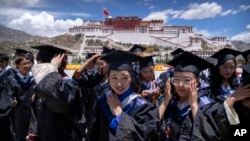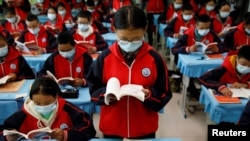On August 22, U.S. Secretary of State Antony Blinken announced visa restrictions on Chinese officials suspected of involvement in the "forcible assimilation" of Tibetan children into state-run boarding schools.
Blinken said the move was in response to China's coercive policies that seek to "eliminate Tibet's district linguistic, cultural, and religious traditions among younger generations of Tibetans."
Blinken's comments angered Beijing.
Chinese Foreign Ministry spokesperson Wang Wenbin responded on August 23, saying the boarding schools were set up to help the highly scattered population in Tibet to congregate and to ensure all children's equal right to education:
"The rights and freedoms of all ethnic groups, including the freedom of religious belief and the freedom to use and develop their ethnic groups' spoken and written languages, are fully protected," Wang told reporters. "The boarding schools in Tibet are examples of human rights and cultural heritage protection. The so-called 'forced assimilation' is pure fabrication."
That is false.
According to a U.N. Human Rights Office report published in February, about 1 million Tibetan children have been herded into state-run boarding schools as part of a push to forcibly assimilate Tibetans into China's majority Han culture.
The U.N. report indicated that the curriculum and environment in these residential schools are built around Han culture, with textbook content centered on the experience of Han students.
"Children of the Tibetan minority are forced to complete a 'compulsory education' curriculum in Mandarin Chinese (Putonghua) without access to traditional or culturally relevant learning," the report said.
It also noted that these schools fail to provide a substantive study of the Tibetan minority's language, history and culture.
At the same time, the number of boarding schools operating in and outside of Tibet has substantially increased, the U.N. experts pointed out.
In 2010, China introduced a policy of "bilingual education" for all schools in minority areas in China. According to Human Rights Watch (HRW), a New York-based rights group, this approach to minority education is considered appropriate internationally when it promotes competency in both the local and the national language.
Yet HRW pointed out that in Tibet's case, authorities put "indirect pressure to push primary schools, where an increasing number of ethnic Chinese teachers are teaching, to adopt Chinese-medium instruction at the expense of Tibetan, such as allocating increasing numbers of ethnic Chinese teachers who do not speak Tibetan to positions in Tibetan schools."
While Tibetan and English courses would be taught in Tibetan, courses other than Tibetan and English were to be taught in Mandarin Chinese.
The policy restricting the use of Tibetan in schools sparked protests by Tibetan students across China.
An article published by China's state-run Global Times newspaper in January 2016 confirmed that Tibetan schools, especially in urban areas, were increasingly "using Putonghua [standard Chinese] as the primary language of instruction, with Tibetan being used only in classes where the Tibetan language is the topic of the class, if it is taught at all."
In 2018, an activist who campaigned for Tibetan language education was sentenced to five years in prison for "inciting separatism."
In August 2021, China's leader Xi Jinping said all ethnic groups must place the nation above all else.
"All ethnic groups should be guided to always place the interests of the Chinese nation above anything else, with their consciousness of different ethnic groups serving the sense of community for the Chinese nation as a whole," the Xinhua News Agency quoted Xi as telling a central conference on ethnic affairs in Beijing in August 2021.
Xi also stressed that "ethnic separatism and religious extremism should be continuously eliminated" and the Chinese Communist Party's "leadership over ethnic work must be upheld."








